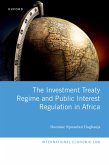Through meticulous research and incisive analysis, this book confronts the uncomfortable truths that challenge the notion of blind justice. From disparities in sentencing based on race, gender, or socioeconomic status to the subtle biases that influence decision-making in mediation settings, each chapter unveils the multifaceted ways in which favoritism and discrimination manifest within the legal realm.
Drawing upon interdisciplinary perspectives from law, sociology, psychology, and ethics, this volume offers a comprehensive examination of the root causes and consequences of bias within the American legal system. Moreover, it explores strategies for reform and avenues for promoting greater fairness, accountability, and transparency in both judicial proceedings and alternative dispute resolution mechanisms.
With a blend of empirical evidence, real-world case studies, and thought-provoking insights, "Favoritism and Discrimination in the American Judicial and Mediation Systems" serves as a vital resource for scholars, practitioners, policymakers, and anyone concerned with the pursuit of justice and equality in contemporary society. By confronting the uncomfortable realities of bias and discrimination, this book aims to inspire meaningful dialogue, spark systemic change, and ultimately, uphold the foundational principles of fairness and equity upon which the legal system is built.
Dieser Download kann aus rechtlichen Gründen nur mit Rechnungsadresse in A, B, CY, CZ, D, DK, EW, E, FIN, F, GR, H, IRL, I, LT, L, LR, M, NL, PL, P, R, S, SLO, SK ausgeliefert werden.









